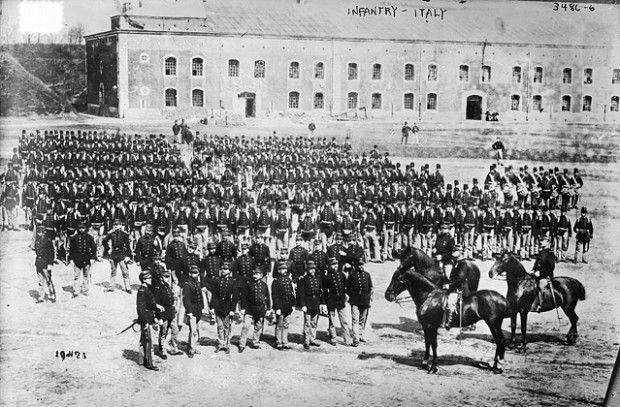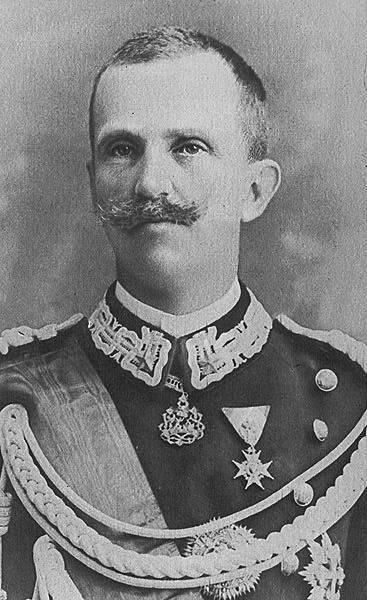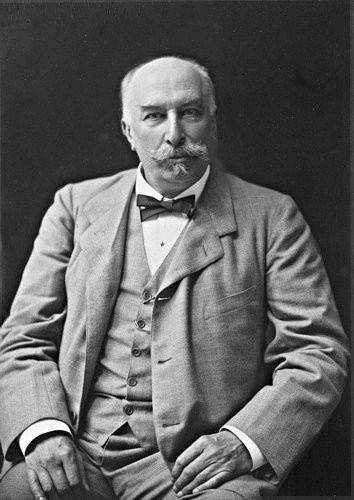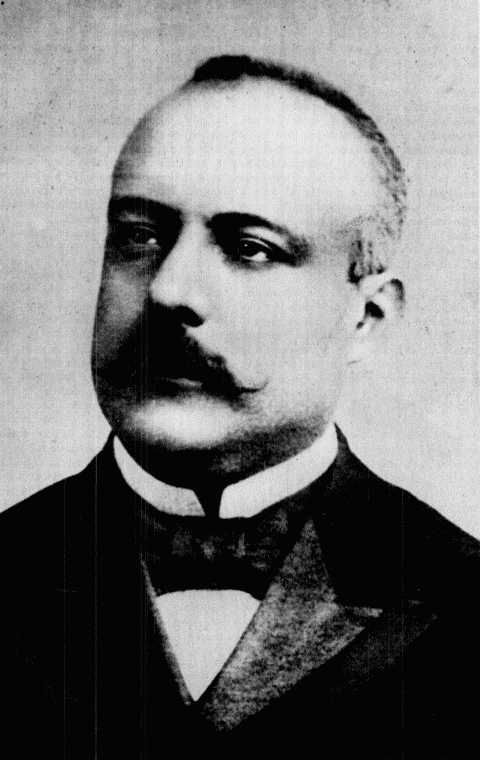Italian "jackal" enters the war

100 years ago, 23 May 1915, Italy declared war on the Austro-Hungarian Empire. Formed Italian front. Since the beginning of World War I Italians traded with both sides - the Entente and the central powers. The political struggle was particularly acute in the 1915 year, with the result that Italy chose the Entente. Immediately after the declaration of war, on the night of May 24, the Italian forces launched an offensive without completing the concentration and deployment of the army. The Italian army surpassed the Austro-Hungarian troops by two. In addition, the most efficient Austro-Hungarian troops fought in other directions. Therefore, the Italians were counting on quick success, but miscalculated.
Prehistory of the entry of Italy into the war
Until 1870, northern Italy, from Milan to Venice, was part of the Hapsburg Empire. Historically, Vienna had interests in Italy. The pope ruled a vast area in central Italy, and papal power did not seek the unity of Italy. Southern Italy was among the interests of France. Italy has long been fragmented. However, the Sardinian kingdom (Piedmont), led by King Victor Emmanuel II (King of Italy in 1861-1878), was first supported by France and then Prussia was able to unite most of Italy. During the Austro-Prussian-Italian War 1866, the Italians got Venice. In 1871, the capital of Italy was moved from Florence to Rome.
Italy became a full-fledged European power, which sought to complete the unification of the country (a number of northern regions and cities remained under the rule of Austria-Hungary and France) and gain influence in the Mediterranean, including the Western Balkans and in Africa. In 1873, the Italian king, Victor Emmanuel, visited Berlin and Vienna, promoting the rapprochement of the three powers. However, between Italy and Austria-Hungary remained strong contradictions. The Austro-Hungarian empire owned Trieste, Dalmatia, Istria, and Tirol, which Rome claimed, and thwarted the plans for the establishment of "Great Italy", which included seizures in the Balkans. As a result, Vienna was Rome’s main rival in Europe.
However, not being able to immediately implement their plans for territorial expansion at the expense of Austria-Hungary and the Balkans, the Italians turned their attention to North Africa. The young Italian state had no colonies, and Rome wanted to fix it. The main region of the spread of colonial expansion in Rome saw Africa. First, North Africa was nearby, which made it easier for territorial seizures. Secondly, in Rome they remembered that Ancient Rome, which the Italians considered themselves heir, had significant possessions in North Africa. However, here the predatory interests of Rome clashed with the interests of Paris, which considered a significant part of North Africa to be its fiefdom. As a result, Italy’s conflict with France over Tunisia led the hot-tempered King Umberto I (1878-1900) to an alliance with Germany. Angry that "the French took away Tunisia from under their nose" in 1881, Umberto gave the German Chancellor Bismarck the opportunity to draw Italy into the Triple Alliance. In addition, the Italian king, with an alliance with the largest monarchies of Europe, hoped to consolidate his throne.
The Francophiles in Rome were defeated when French troops entered Tunisia. Italy was forced to seek a strong ally in order to be able to carry out its other predatory plans. Italy could not enter an independent force. Bismarck disdainfully, but aptly called the Italians "jackals" who sneak behind large predators. The Italian government sent an agent to Bismarck to probe the ground in Berlin. Bismarck deliberately received the envoy coldly and noticed that the route to Berlin from Rome ran through Vienna. That is, Italy needed to improve relations with Austria-Hungary. Rome understood the hint and decided on rapprochement with Vienna. A secret Italian envoy arrived in Vienna. For Vienna, such a union was important, so guaranteed the rear in case of war with Russia. Therefore, after some delay, consent was obtained. Bismarck also needed Rome to increase the pressure on France. 20 May 1882 of the year Germany, Austria-Hungary and Italy signed a treaty, known as the Triple Alliance. Germany and Austria promised to support Italy in the event of an attack on her by France. Italy was to speak in the case of a direct attack by France on Germany. All three powers guaranteed friendly neutrality in the event of war with another great power besides France. That is, Italy had to maintain friendly neutrality in the event of war between Austria and Russia.
The alliance with Germany led to an economic war with France, which further aggravated the already weak condition of the Italian economy (for example, Southern Italy lived in hopeless poverty, people from there fled to the United States in search of a new life). There was a severe capital flight that contributed to the economic crisis in Italy. Despite the weakness of the economy and the mass of domestic problems, Italy has embarked on a series of adventures in Africa, trying to seize Somalia and Ethiopia (Abyssinia). These colonial wars cost the kingdom tremendous material and human sacrifices (several Italian troops were completely destroyed), but did not bring positive results. The seizure of a desert and resource-poor Somalia, and even with a rebellious population, cannot be called success. Ethiopia, with the support of Russian military advisers and volunteers, survived and maintained independence.
At the beginning of the 20th century, the Italian economy grew stronger, and the positions of the Italian nationalists strengthened. They preached the ideas of the greatness and superiority of the Italian people, state control over the economy, militarism and colonialism. Therefore, the war with Turkey for Tripolitania (Libya) received the full approval of Italian society. Libya was of military-strategic importance, since, together with Sicily, it dominated the bottleneck of the Mediterranean. However, this value decreased due to the dominion of the British over Malta and the French over Tunisia. In addition, the Rome Bank, associated with the Vatican, had an interest in Tripoli. The influence of financial "aces", apparently, turned out to be the most powerful.
Despite the weakness of Turkey and the apparent ease of seizing Libya, things went bad. The Turks, with the support of the local population, showed unexpectedly strong resistance. War in the desert was difficult, especially when the population was hostile. And the Italian soldiers did not particularly want to fight. Costs turned out to be much more than planned and caused big problems in the economy. As a result, Italy won the war and gained Libya. However, Italian control over Libya remained ineffective until the end of the 1920-s. Italy had to keep considerable military contingent in Libya, to spend a lot of money on it. Italian punitive waged a bloody struggle with the local partisans.
At the beginning of the 20th century, the Tripartite Union was formally preserved (the agreement in 1902 and 1912 was automatically extended), but de facto collapsed. In 1900, Rome secured the consent of Paris to capture Tripoli and Cyrenaica. In 1902, Rome promised Paris to remain neutral if Germany attacked France. As a result, the hostility of Italy and France faded away. In 1909, during the meeting of the Russian and Italian monarchs in Italy, the two powers reached a mutual understanding on the problems of the Balkans and the Mediterranean, which worried them. Italy and Russia agreed together to counteract the Austrian expansion in the Balkans. Rome promised to favor the solution of the problem of the straits in favor of the Russians. Petersburg promised to show the same benevolence to the interests of the Italians in Tripolitania and Cyrenaica.
The war of Italy with Turkey, with which Germany established friendly relations, also did not help preserve the axis Rome-Vienna-Berlin. After some satisfaction of interests in North Africa, Italy began to actively penetrate the Balkans, which contributed to the growth of tension with Austria-Hungary (primarily in Albania).

King of Italy Victor Emmanuel III
Diplomatic struggle for Italy during the war
When a big war began in Europe, Italy declared neutrality. The country was completely unprepared for war, either from a military point of view or from an economic one. Yes, and morale was undermined by errors in the Tripolitan campaign. Therefore, supporters of neutrality, represented by the Catholic party, major industrialists and former Prime Minister Giovanni Giolitti, who led the camp of "pigeons", first won up.
The Triple Alliance has meant nothing. Germany and Austria-Hungary did not trust Italy because of her flirting with France and did not even consult with her whether to start a war. In addition, the Germans were very low on the military power of the Italian army, whose weakness was well shown by its African adventures. Berlin believed that the neutrality of Italy would be beneficial, through it you can get raw materials and food.
However, most of the people who shaped public opinion in Italy were in favor of the war. Nationalists, masons and part of the socialists, led by Mussolini, all supported the war for various reasons. From the very beginning, the Italian government began to bargain, seeing in the war an excellent opportunity to satisfy their most ambitious aspirations. The Italian "jackal", on the recall of Bismarck, was afraid to miscalculate and wanted to speak on the side that would win.
3 August 1914, the Italian king, Victor Emmanuel III, informed the German Kaiser Wilhelm II that, from the point of view of Rome, the start of the war could not force Italy to side with the Central Powers, since Austria started the war. The Italian king went further, making a hint that in Italy there are people who want war with Austria-Hungary. In the fields of the dispatch, Wilhelm himself wrote - "the bastard." On the same day Rome declared neutrality. And then the Italians began bargaining. The Italian Foreign Minister di San Giuliano told the German ambassador that if Italy was well rewarded, she would learn how to assist the allies. 4 August Italians secretly appealed to Russian Foreign Minister Sazonov. Rome reported on neutrality and that, because of the small hopes of getting what they wanted from Germany and Austria-Hungary, Italy could start an “exchange of opinions” on this issue with the Entente powers.
So the Italians acted like real politicians. They did not limit themselves to not supporting the allies, began to blackmail them, but also entered into negotiations with the Entente powers. Began a long bargain on who will give more. Given the superiority of England and France at sea, Italy was not going to fight against the Entente. The question was whether to maintain neutrality or take the side of the Entente.
Already in August, the Entente powers proposed Italy Trentino, Trieste and Valona (Albanian Vlora). It was easier for the Entente to add a price, since Rome claimed lands that did not belong to Russia, France and England. The Italians wanted to get the land of Austria-Hungary, Turkey, and Albania. It should be noted that Russia considered Italy a weak ally. England and France counted by quantity: Italy could set up a million-strong army, and a strong fleet, which strengthened the position of the Western powers on the Mediterranean Sea. In addition, in Paris and London, they took into account the fact that after the victory of the Entente Rome would be supported by the Western powers and three votes against Russia when they “share the skins of dead bears” - Germany, Austria-Hungary and Turkey.
Berlin and Vienna were harder. From the point of view of the Italians, the areas themselves belonged to Austria. Even for a simple neutrality, the Italians asked Trentino and part of Tyrol. Germany tried to seduce Italy with generous promises at the expense of France. Rome was promised to give the French, Nice, Savoy (the French captured them in 1860 year), Corsica, and the French colonies in North Africa. But Rome rested. Like, it is still unknown how the war will end, whether it will manage to snatch lands from France. Let the Austrians give up the land immediately.
While the bargaining was going on, the Italian "jackal" was not asleep, and in 1914 he captured the island of Saseno, at the entrance to the Bay of Valon and then to Valon. Italian Prime Minister Antonio Salandra (March 1914 - June 1916), unlike his predecessor D. Giolitti, was a “hawk” and joined Italy in the war on the side of the Entente. He even gave a political and moral rationale for the principles (or rather unprincipledness) of Italian politics, stating in September 1914 of the year that Rome removed from its policy "every care, every prejudice, every feeling that would not be instilled solely by only one infinite devotion to the motherland, the Italian sacred egoism. "
The powerful offensive of the German corps through Belgium and the German withdrawal to Paris supported in Rome the propensity for neutrality and the continuation of negotiations with Berlin. The battle of the Mark and the failure of Germany’s plans to quickly defeat France intensified negotiations with the Entente. Rome demanded a surcharge from the Entente. Serbia, which did not want the Italians to penetrate the Balkans, intervened in the negotiations. Belgrade did not want concessions at the expense of Dalmatia, inhabited mainly by the Slavs. However, the Austrian government did not want to cede their lands. Then Rome began to threaten Berlin and Vienna, that “public pressure” would force Italy to stand up for the Entente. The German government stepped up pressure on Vienna.
In December, 1914 arrived in Rome by Prince Bülow, who was once the ambassador to Italy. Italian Foreign Minister Sydney Sonnino told Bülow that the Entente is offering Rome all regions of Austria inhabited by Italians as a reward, so to avoid war, Vienna should offer at least Trentino. The Vatican supported this demand. I must say that the Vatican actively supported the Central Powers. The Pope wanted to preserve the Habsburg Empire, as the last Catholic great power. However, the Austrian emperor did not want to hear about the concessions to Italy.
Continuing bargaining with the Central Powers, in early March 1915 Rome intensified negotiations with the countries of the Entente. In addition to Trentino, Trieste, Valona, the islands of Sasena, Dalmatia with islands, colonial sections in Africa, the Italians demanded the formation of an autonomous principality in central Albania with the capital in Durazzo (Durres), clearly hoping to subjugate weakened and truncated Albania. It was proposed to divide the northern part of Albania between Serbia and Montenegro, and the southern part to surrender to Greece. From Turkey, Italians wanted to get Antalya and Izmir. The Italians demanded a loan of £ 50 million from London. In addition, Rome wanted Russia to guarantee strong pressure on Austria-Hungary in Galicia, and the British and French fleets helped the Italian the fleet in the fight against the Austro-Hungarian naval forces. England and France quite easily agreed with all the requirements of Italy. Like, we promise today, and after the victory we will give what we want. Russia, due to solidarity with the Serbs, still argued over the lands inhabited by the Slavs.
Soon, Italy received a new means of pressure on the Entente. 8 March 1915, the Crown Council in Vienna agreed to concessions to Rome. Negotiations began between Italy and the Central Powers on the subject of which lands Austria would cede, cede them immediately or after the war. Russia under pressure from Britain and France was forced to agree to the cession of Italy to most of Dalmatia. As a result, the Entente has satisfied almost all the claims of Italy. 26 April 1915 was signed an agreement. Italy pledged to take the side of the Entente a month later. Italy was to receive South Tyrol, Trentino, Trieste, Istria, part of Dalmatia and Albania, including Valona (Vlora), Dodecanese islands, part of the colonial possessions of Germany, etc. England promised 50 million loan. Serbia promised part of Dalmatia with Split part of Albania, Montenegro - part of the coast of Dalmatia and Albania.
3 May 1915, Rome terminated the Agreement on the Triple Alliance. On May 9, Bülow took a decisive step: he offered to cede part of Tyrol, inhabited by Italians, as well as Gradisca and the western part of the Isonzo river. Trieste was to become an imperial free city with Italian self-government and a university. Vienna recognized the sovereignty of Italy over Valona and renounced claims to Albania. Bülow immediately reported this to the leader of the Italian "pigeons" Giolitti. The former prime minister immediately arrived in Rome and enlisted the support of 320 deputies from 508, that is, the majority. Relying on the parliamentary majority, Giolitti told the monarch and prime minister Salandra that he did not agree with the policies that were approved in London. Salandra resigned.
It seemed that Germany was able to turn the tide in its favor, and Italy would be neutral. However, at this critical moment, the nationalists, masons and socialists, led by Mussolini and Annunzio, behind whom stood the financial "aces" and the interests of France and England, put strong pressure on power. In Rome, there was a wave of demonstrations against the parliament. The king did not accept the resignation of Salandra. Giolitti was forced to leave the capital. 20 May frightened deputies voted for military loans. 23 May Italy declared war on the Habsburg Empire.

Giovanni Giolitti

Antonio Salandra
To be continued ...
- Alexander Samsonov
- 1915 Campaign
Military plans of the Entente and the Central Powers for 1915 year
Death of the 20 Russian Corps
"Rubber War" in the Carpathians
Battle for Prasnysh
Information